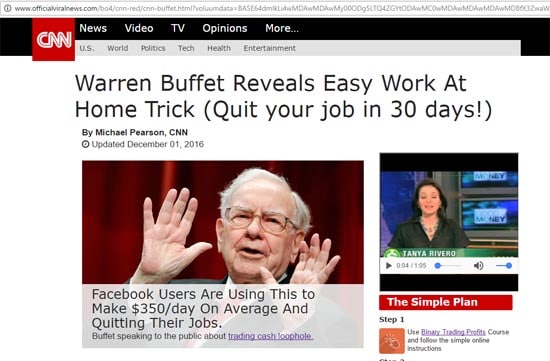Here is how a spammy Facebook ‘Sponsored Ad’ can deceive you…
A sponsored advert that popped up on our Facebook newsfeed today demonstrated that not only do scams still appear on Facebook’s “Sponsored Ad” platform, but Facebook actually allow such ads to be tailored specifically to deceive users.
Take the below advert, for instance.
The advert purports that well-known businessman Warren Buffet is promoting some sort of “cash making opportunity” that, according to the sponsored ad above, won’t last much longer.
Now, the more sceptical or seasoned Internet surfer will no doubt have their internal alarm bells ringing already.
And they’d be justified for doing so. The ad leads to a well-known get-rich-quick scam exploiting the Binary Options Trading platform. To briefly surmise, Binary Options is a form of stock investing. However many spammers exploit it by claiming it’s a get-rich-quick scheme (it isn’t) or a guaranteed route to wealth (it isn’t) or, in this case, an opportunity that lets people quit their jobs in 30 days (definitely isn’t that either.) Basically, spammers lie to try and lure people into signing up so they can make a commission. We discuss it in more detail here.
However this article isn’t about Binary Options Trading or the scams that exploit it. It’s about how and why these adverts continue appear on Facebook’s Sponsored Ads platform, and how they even manage to publish fake web addresses on the ads to deliberately fool those who see the advert on their newfeed.
Take another look at the Warren Buffet ‘sponsored advert’ above and take note of the web address that appears at the bottom of the ad. Money.cnn.com is the subdomain belonging to CNN’s financial section of their website. If you click a link to this domain, you wouldn’t expect to be landing on a scam.
Sponsored Content. Continued below...
But the link doesn’t take you to CNN’s webpage. Facebook’s ‘Sponsored Ad’ platform allows those who place adverts to disguise the true web domain that the adverts link to when clicked by replacing them with something another domain. In this case, as you can see from the landing webpage below, the site we were led to belonged to OfficialViralNews.com, not CNN’s website.
And this is a website that certainly could scam you.
It’s bad enough that Facebook continually allow these scams to appear on their Sponsored Ad platform, but they also allow the spammers to disguise the web domain of the advert.
This all goes to demonstrate that you cannot trust Facebook’s Sponsored Ads, even if the web address on the advert suggests the advert may be legitimate. Since a large portions of Facebook’s ad revenue comes from such adverts, we hope they have a vested, long-term interest in keeping such adverts safe and spam-free.
For the moment, however, the much shorter-term motivation of allowing anyone to pay up to have their adverts displayed seems to have priority.
Keep up-to-date with all the latest cybersecurity threats and our tips to stay safe online. Follow us on Facebook, Instagram and Twitter.
Continued below...
Thanks for reading! But before you go… as part of our latest series of articles on how to earn a little extra cash using the Internet (without getting scammed) we have been looking into how you can earn gift vouchers (like Amazon vouchers) using reward-per-action websites such as SwagBucks. If you are interested we even have our own sign-up code to get you started. Want to learn more? We discuss it here. (Or you can just sign-up here and use code Nonsense70SB when registering.)
Become a Facebook Supporter. For 0.99p (~$1.30) a month you can become a Facebook fan, meaning you get an optional Supporter Badge when you comment on our Facebook posts, as well as discounts on our merchandise. You can subscribe here (cancel anytime.)


